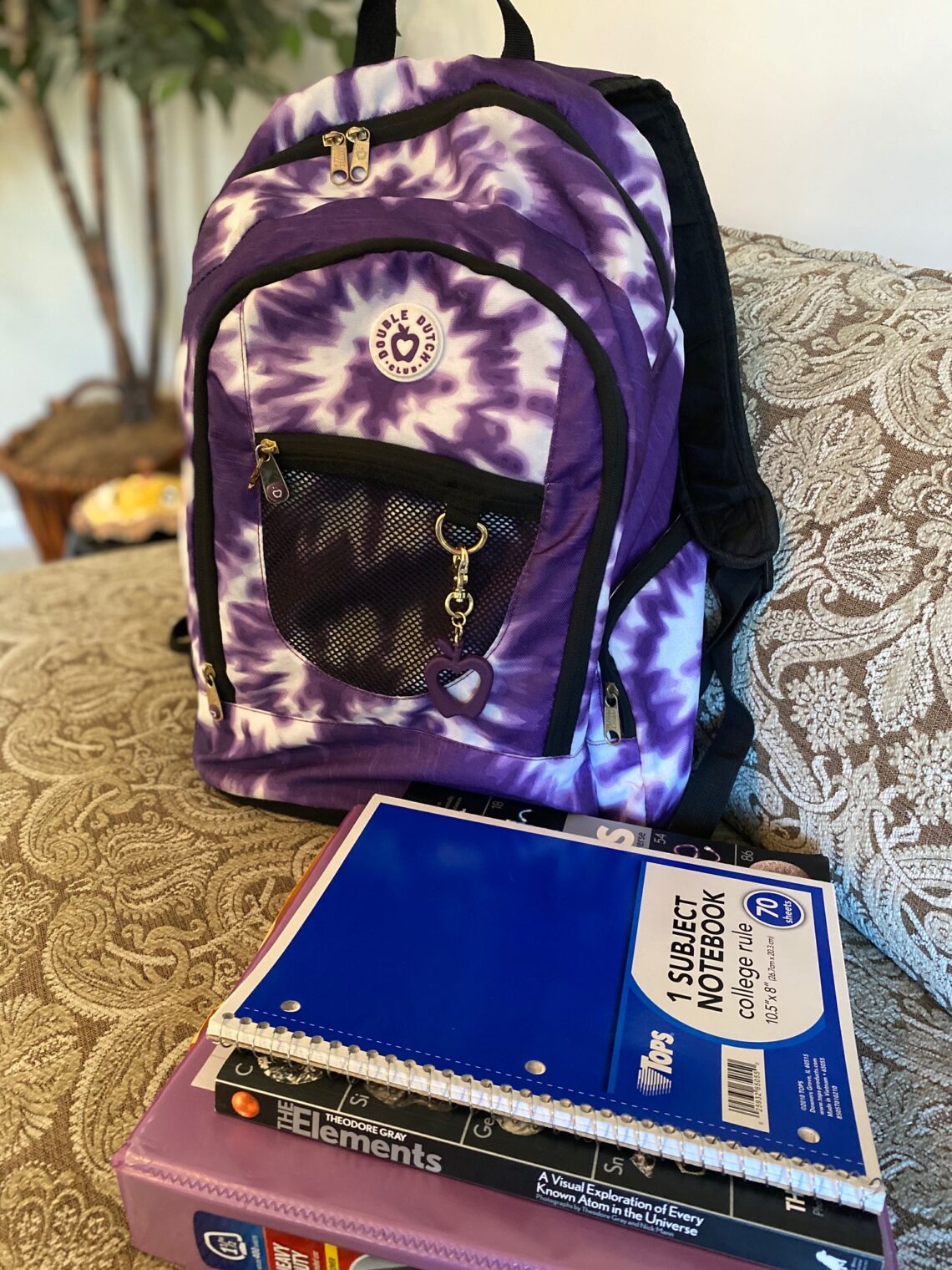Back to school in 2020
I let my kids out into the world yesterday, and let me just say, it was scary. Not only are these kids having to deal with the stress of starting a new school year but they have to do it in the midst of a pandemic. For weeks now, my social media feed has been flooded with posts about online versus traditional in-person school. I know there are a lot of you out there who are questioning your decision. Trust your decision. You made the choice that was right for your family. Which option did you decide on? At first, I was pretty sure that there was no way that I would be sending my kids out there. We had done everything we could to be safe and protect ourselves from contracting the virus. When the time came to make our final decision, it was clear. Despite our fears and reservations, we were going to trust that our school district’s plan was a solid one, and we were going to let our children attend classes at school. One of the big deciding factors for us was the fact that our sweet 16-year-old depressed daughter needed to get back into the world. She needed to get back into a classroom and find some structure to regain a sense of normalcy. Her mental well-being is always front and center in our minds and after weighing the options, we felt that sending her to school was the best thing to do. She was on board with our decision because she feels that the classroom setting is more conducive to her learning. Our son just started his senior year of high school. Needless to say, he is excited to do it alongside his friends, mask and all.

Depression in teenagers can manifest in many different ways. Before being diagnosed, our daughter’s schoolwork and grades took a hit. Her poor grades had a direct impact on her self-esteem and mood. She was consumed with feelings of helplessness and had difficulty focusing on simple tasks. We are determined to take all the steps necessary to keep things from spiraling out of control this school year. Our girl is determined to make the most of her junior year and we as parents are determined to help her stay on track, for her mental well-being and ours. So let me fill you in on our proposed action plan for the school year ahead.
8 ways to help your depressed teen cope with school
1. Create a daily schedule
The kids had been out of school since the middle of March. That’s a pretty long time to be out of school. They finished up the last school year with online classes, and then came summer. Oh, summer….lazy, lazy summer. I have a love-hate relationship with this season. The summer of 2020 will certainly go down in the history books as the most unconventional one yet. Summer is certainly a time for relaxation and renewal but as I’m sure you might have noticed, kids can get a little lazy. If this doesn’t happen in your house, lucky you! Sure chores get done, but not always on the timeline I create in my mind. That’s where school comes in. It ushers in the end of summer. It puts the kids on a regulated daily schedule. It gives them a sense of purpose and in the end, whether they recognize it or not, it gives them a sense of accomplishment. I can’t stress how important this is for a child struggling with depression. It may be difficult but it must be done. If not, there may be consequences. It’s important to strike a delicate balance here, you don’t want to push too hard and cause undue stress. Instead, be a source of encouragement and a beacon of hope. Our daughter has chosen not to do any after-school activities and this gives us the freedom to create a predictable after-school schedule which looks something like this…..
- Pick up from school
- Activity with relaxation and unwinding in mind
- Go home
- Shower
- Have dinner
- Quiet time or short nap time
- Homework
- Chores (kept at a minimum during the week)
- Go to bed
- Get up and go to school
Regularity and predictability are key to our daughter’s success. She may not like some aspects of our after-school schedule but she knows what is expected of her.
2. Do something relaxing after school
As a child, I always felt drained at the end of the school day. School is hard, at least it was for me. I wasn’t the sharpest tool in the shed. I guess the fact that I had to travel one hour to school and one hour back home had something to do with it. Thankfully my kids don’t have to do that. My heart would break for them if the journey to school was that long. No matter how difficult or long my day was, I always sat down to watch Sesame Street with my parents when I got home, yep, even in high school. I love that show! I made some wonderful memories with my parents then, memories I hold dear, now that they are no more. My daughter chooses the gym as her source of relaxation and unwinding. We go every day after we pick her up from school. EVERY DAY. She gets to let off steam, she is getting stronger, it increases her self-esteem and it lightens her mood. What would your relaxing activity be? Maybe a walk, a run or a trip to the ice-cream shop would do. Whatever it is, take the time to do it. It will do wonders for your depressed child, and you.
3. Set realistic goals
I believe in putting up your goals on the wall. Look at it often, remind yourself of your purpose and your goals, and use it as a road-map to your success. My daughter thinks it’s silly but I’ll just ignore her thoughts on the matter and we will move on to make it happen.
- Write it out: Make it colorful and eye-catching and big enough to see when it is up on the wall
- Create a vision board: Cut out pictures, do drawings, and add text to create a visually stimulating product
- Do a scrapbook page: If you’re the scrapbooking kind, I know you’ll have some fun with this one!
Whichever one you choose……
- make it a fun activity
- include your child in the creative process despite their grumblings, aka don’t do it for them
- make it colorful
- be specific in your goals, make sure they are realistic and attainable
- review it daily, more than once
4. Establish Accountability
Before our daughter was diagnosed, as I mentioned before, her school-work was suffering. She was missing assignments and turning in others late. She would be so out of sorts that she would be unable to keep up until things just started snowballing out of control. This was a really difficult time for her and us as parents. It was difficult to watch, and it felt impossible to fix. Needless to say, staying on top of assignments this time around is of paramount importance to us all. As our kids get older, we give them the freedom to take charge of their affairs and be prepared to face the consequences if they don’t stay on top of things. We can do this with our son but we have come to an understanding with our daughter that we would “meddle” a little. At first, I think it was annoying to her, but once she started taking her medication and learning new skills with her therapist, she saw the value of our decision. Every day she has to let us know what assignments have been given and when each one is due. She is also required to show us completed assignments that are ready to be turned in. We are also there to lend a helping hand if she is having difficulty. There is no better feeling than actually checking something off a to-do list. She gets to do that, and I know it gives her a sense of accomplishment.
5. Take one day at a time, one task at a time
This is VERY important. Your depressed child can become easily overwhelmed and so he or she must tackle things one at a time and take things one day at a time. It will increase productivity and decrease stress. It will help you keep your sanity too.
6. Stay organized
Organization prevents chaos. Chaos erases peace of mind. We encourage our daughter to stay organized. She tends to just stick important pieces of paper any and everywhere and when the time comes to fetch them, she has no clue where they are. We have spoken to her about making a real effort to avoid doing this and to stay organized. We expect her to write down assignments given at school and to put papers in marked folders. Organization at home is of paramount importance too. Do your kids peel off their clothes after school and just leave them on the floor? My kids do, and it drives me nuts. Have them pick up after themselves and encourage them to keep a tidy room. That eliminates the feeling of chaos, especially the one in my head, and it gives a sense of order and structure to their physical surroundings.
7. Establish a reward system
This will involve things that make your child happy and bring a smile to his or her face. What does this look like for your child? My kid loves Starbucks, so a trip there makes her efforts worth it. Maybe a promise to go somewhere fun on the weekend like the mall or the movies will do the trick. The point is, when you reward their efforts, it encourages them to keep going. Just to be clear, the rewards don’t have to cost you a penny. Get creative, come up with ideas that fit your family’s situation. Also, rewarding your depressed child shouldn’t be an all or nothing affair. He or she may not always get it right. Make sure to reward them for their efforts too. For them, making it through the day is a structured process and we don’t want to propel them back to square one with negativity or a lack of appreciation for their efforts. Encouragement is key.
8. Be available
Out of all that we have talked about thus far, this is the most important. Kids, whether they are little or grown, want to be heard. Ask them how their day at school was, listen to their stories and give them the attention they need and deserve from you. You will hear me say this often because my daughter has called me out on it, do all of those things after you put your phone down. Undivided attention is something we all deserve. I know work and school and everything in between can make us feel like there are not enough hours in the day to get things done. I get it. You don’t need a lot of time to show your child that you are there for them. Whatever time you can carve out in your busy day for them, do it.

Having a depressed teenager is tough. It breaks your heart to see them struggle. You are not alone. I hope that this has been helpful to you in some way.






4 Comments
Sarah Waterbury
August 7, 2021 at 9:57 pmMy niece battles with depression and she just finished high school this June. It was extremely hard for her since the beginning of this pandemic. I wish her caregivers had read this post, it would have set some healthy boundaries and helped a lot, I’m sure.
Danielle
August 8, 2021 at 7:57 amThank you so much for writing this. It has to be so difficult to experience this as a parent. I love the routine/schedule part for her. That consistency would feel safe.
Hege Rebecca
August 8, 2021 at 2:11 pmThanks for sharing these tips! They’re super helpful
Patricia Chamberlain
August 8, 2021 at 5:43 pmThese are great tips. Setting realistic goals is so important!